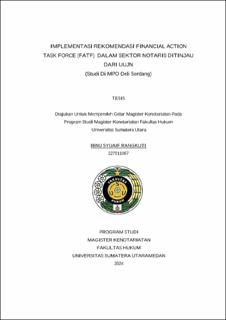| dc.contributor.advisor | Mulyadi, Mahmud | |
| dc.contributor.advisor | Suprayitno | |
| dc.contributor.author | Rangkuti, Ibnu Syuaif | |
| dc.date.accessioned | 2025-02-18T04:17:14Z | |
| dc.date.available | 2025-02-18T04:17:14Z | |
| dc.date.issued | 2024 | |
| dc.identifier.uri | https://repositori.usu.ac.id/handle/123456789/101395 | |
| dc.description.abstract | One of the efforts to prevent and combat money laundering and terrorism financing crimes is the application of the Know Your Customer Principle (KYC). This is reinforced by Law Number 8 of 2010 concerning the Prevention and Eradication of Money Laundering and Law Number 9 of 2013 concerning the Prevention and Eradication of Terrorism Financing. Notaries, as members under the Financial Action Task Force (FATF) framework at the Regional Supervisory Council (MPD) level, have the authority and obligation to provide guidance and supervision to notaries in their regions (at the municipal/regency level), as determined by the Decree of the Regional Office of the Ministry of Law and Human Rights. The research location is the MPD of Deli Serdang. The research questions are: the legal basis for notaries as institutional actors in preventing money laundering and terrorism financing crimes under FATF; the duties of notaries from the perspective of Positive Law and FATF recommendations in Indonesia in the prevention of money laundering and terrorism financing; the implementation of FATF through MPD Deli Serdang in ensuring commitment and compliance in applying the Know Your Customer Principle (KYC) by notaries in Deli Serdang.
This research employs an empirical juridical method, also known as field research, supported by primary and secondary data, and analyzed qualitatively.
The results of the study show that the main basis for involving notaries is their role as Gatekeepers through the implementation of Beneficial Ownership Identification. However, the risk of notaries being involved in disputes over beneficial ownership or participation in money laundering/terrorism financing crimes is not yet supported by clear legal protection, which is essential for ensuring legal certainty to protect notaries. The duties of notaries, as viewed under positive law and FATF recommendations, are regulated in the legislation for applying the Know Your Customer Principle (KYC), specifically in the Ministry of Law and Human Rights Regulation No. 9 of 2017, which aligns with FATF Recommendations 24 and 25. These principles are implemented through the completion of Customer Due Diligence (CDD) and Enhanced Due Diligence (EDD) forms. The implementation of these recommendations faces several challenges, such as: Capacity and Knowledge Barriers: Not all notaries fully understand FATF regulations or have adequate training regarding their obligation to report suspicious transactions. | en_US |
| dc.language.iso | id | en_US |
| dc.publisher | Universitas Sumatera Utara | en_US |
| dc.subject | FATF | en_US |
| dc.subject | Regional Supervisory Council | en_US |
| dc.subject | Notaries | en_US |
| dc.subject | KYC Principle | en_US |
| dc.title | Implementasi Rekomendasi Financial Action Task Force (FATF) dalam Sektor Notaris Ditinjau dari UUJN (Studi di MPD Deli Serdang) | en_US |
| dc.title.alternative | Implementation of the Financial Action Task Force (FATF) Recommendations in the Notarial Sector from the Perspective of UUJN (Study at the MPD of Deli Serdang | en_US |
| dc.type | Thesis | en_US |
| dc.identifier.nim | NIM227011067 | |
| dc.identifier.nidn | NIDN0001047403 | |
| dc.identifier.nidn | NIDN0101056502 | |
| dc.identifier.kodeprodi | KODEPRODI74102#Kenotariatan | |
| dc.description.pages | 149 Pages | en_US |
| dc.description.type | Tesis Magister | en_US |
| dc.subject.sdgs | SDGs 16. Peace, Justice And Strong Institutions | en_US |


